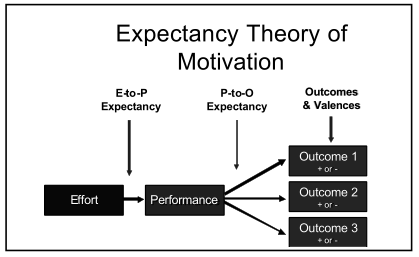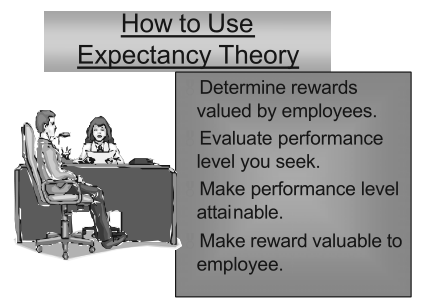David McClelland, in association with other researchers, developed achievement-motivation theory. According to this theory, if a person spends considerable time thinking about doing his or her job better, accomplishing something unusual and important, or advancing his or her career, that individual has a high need for achievement (nAch). Those who have high need for achievement (1) like problem situations in which they take personal responsibility for finding solutions (ones in which the possibilities of reaching them are reasonable), (2) tend to set attainable achievement goals, and (3) want feedback on how they are doing.’ In practical terms, nAch is a motivation to exceed some standard of quality in personal behavior individuals who are self-motivated and who continually strive to improve their performance are in this category.” Many individuals like this are attracted to personal selling jobs, especially those where compensation is largely in the form of commissions- jobs characterized by opportunities to influence outcomes through personal efforts, challenging risks, and rapid feedback of results.
What are the implications for sales management? If individuals with high nAch can be the best performers in the company’s sales jobs, then management might target its recruiting toward such people. McClelland and his co investigators used the Thematic Apperception Test (TAT) in their research on achievement, so management might consider including the TAT in the sales selection system. But management would want to make certain that the sales job environment was one in which high achievers flourish.
The fact that nAch drives individuals to act from an internally induced stimulus are noteworthy People with high nAch are self starters-they require little external incentive to succeed and constantly challenge themselves to improve their own performances Such people do not require motivation by management other than that of providing the right kind of job environment. Understanding the concepts behind nAch, and the conditions that individuals high in nAch seek in their jobs, helps to explain and predict the behavior of sales personnel.
Expectancy Model
- Expectancy Theory
- Motivation depends on how much we want something and how likely we are to get it.
- Assumes that:
- Behavior is determined by a combination of personal and environmental forces.
- People make decisions about their own behavior in organizations.
- Different people have different types of needs, desires, and goals.
- People choose among alternatives of behaviors in selecting one that that leads to a desired outcome.
- Motivation leads to effort, when combined with ability and environmental factors, those results in performance which, in turn, leads to various outcomes that have value (valence) to employees.
- Elements of Expectancy Theory
- Effort-to-Performance Expectancy
- The employee’s perception of the probability that effort will lead to a high level of performance
- Performance-to-Outcome Expectancy
- The employee’s perception of the probability that performance will lead to a specific outcome—the consequence or reward for behaviors in an organizational setting.
- Valence
- An index of how much an individual values a particular outcome.
- It is the attractiveness of the outcome to the individual.
- Attractive outcomes have positive valences and unattractive outcomes have negative valences.
- Outcomes to which an individual is indifferent have zero valences.
- For motivated behavior to occur:
- Both effort-to-performance expectancy and performance-to-outcome expectancy probabilities must be greater than zero.
- The sum of the valences must be greater than zero.
The strength of an individual’s motivation to behave in a certain way (in terms of efforts) depends upon how strongly that individual believes that these efforts will achieve the desired performance patterns (or level). If the individual achieves the desired performance, then how strongly does the individual believe that the organization’s rewards/punishments will be appropriate for that kind of performance, and to what extent will this satisfy the individual’s needs (goals)?
The expectancy model raises motivational issues of concern to sales management. Does the company reward structure provide what sales personnel want? Do individual sales personnel perceive the kinds and amounts of effort management anticipate that they will make to attain set performance levels? How convinced are individual sales personnel that given performance patterns lead to given rewards?


Sales management, however, must recognize that this model is concerned with expectations. Sales personnel need counseling to view their own competencies realistically. They also need sales management’s support in developing the skills that lead to improved performance.
Let us study how salespeople can be motivated?
Three elements affecting motivation can be found within the organizational environment
- The individual salesperson
- The sales job
- The organization environment
The individual salesperson
- Unique needs of each individual salesperson
- Positive reinforcement
- Once financial security is met, appeal to other needs
- If time restraints make it impossible for the sales manager to learn and respond to the needs of each salesperson, then segment the sales force in clusters
- Explain the job requirements and expectations
To motivate individual salesperson
- Train the salespeople to be professionals
- Provide the incentives necessary for salespeople to want to do their best
- Sales management should provide rewards that are:
- Simple
- Immediate
- Frequent
- Related to the special act
- Sales management should be cognizant of the motivational value of personal visits, personal phone calls and letter, and small, intimate sales meetings
The Sales job
- Sufficient product information
- Communication
- Help each salesperson set reasonable goals and design plans to attain those goals, and provide feedback
- Positions should be challenging, have some authority, and provide some freedom
- Recognize the frequent adversities faced by the salesperson
- Prevent job dissatisfaction by providing a fair basic compensation plan, helpful and constructive supervision, acceptable fringe benefits, and job security
The organization environment
- Take an active role in developing the motivational processes
- Provide a participative environment
- Must communicate and maintain an open, constructive, and relaxed environment where trust, faith, and fairness are openly practiced
- Through formal and informal channels, communicate that the salespeople are mature, professional individuals involved in significant, meritorious work
- Communicate clearly the relationship between performance and recognition
- Once the desired level of income has been reached, salespeople typically strive to satisfy such needs as status, prestige, recognition, the need to win, and opportunity to serve, and the respect and affection of management and peers
- Four important aspects that unsuccessful salespeople do not have:
- Positive attitude
- Personal goals
- Time organization
- Enthusiasm
Three facets of non monetary motivation:
- Recognition
- Awards
- Special communications
Recognition
- Recognize everyone
- Recognize publicly
- Record the recognition
- Involve top management
- Make it personal
- Don’t use negative recognition
- Put the winner in the center
Award: is physical evidence that the receiver can take home and show friends, family, and peers
- Personal and fit the occasion
- Distinctive
- Show that the individual level of achievement is consistent with the organization’s goals
- Can be honorary job titles
Special communications
- Newsletters
- Articles or news features about special efforts made
- Pictures of the top salespeople
- Spot for award recognition
- Individual letters/special telephone calls

